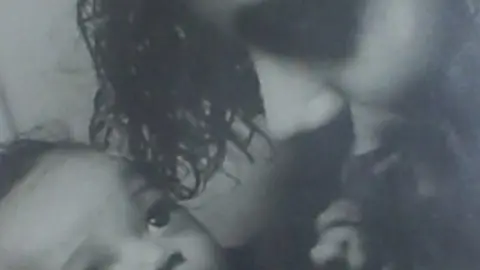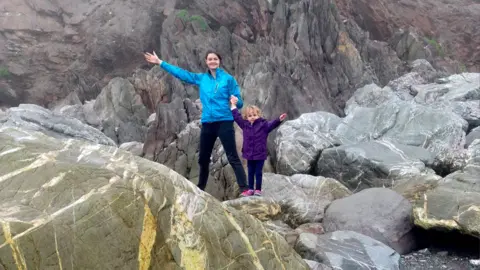Sex ed 'must cover respect and consent', say young mums
 BBC
BBC"Some of the things I did as a teenager, I think, 'What the hell were you doing? Why did you do that? Why did you let this person take advantage of you?'"
Christina fell pregnant when she was just 14. Reflecting on her teenage experiences, she says she wishes she had been more confident about saying "No."
For her, a revised sex and relationships education (SRE) curriculum currently being drawn up for schools in England must focus on the emotional.
"I think that the curriculum needs to emphasise the love and relationship side rather than the physical side, because everyone knows where babies come from.
"It's about young people being emotionally stable and confident enough to say, 'No.'"
Commenting on the BBC's Family and Education Facebook page, a group of mothers - who had their first child when they were teenagers - say youngsters need to learn about issues such as:
- consent
- coercion
- grooming
- abusive relationships
- sharing intimate photos and videos
- the pressures of social media
- the risk of having their drinks spiked with date-rape drugs
Their thoughts come as an eight-week call to evidence from the Department for Education, where members of the public can send in their views to policymakers, draws to a close.
'Left feeling used and dirty'
Christina says getting involved in early sexual experiences can often be about underlying mental health issues such as low self-esteem.
"If someone's missing something in their life or they've had a trauma or a loss and they're desperately seeking to fill the void, they might search to fill that void in the means of a sexual relationship with somebody.
"And I think possibly, on reflection, maybe that's what I did - I was looking to fill the void of being adopted and not knowing my biological family.
"So I decided to embark on these relationships hoping that they'd be meaningful - they were meaningful to me, but they weren't meaningful to the people that I was involved with.
"And that damages you even more in the long run because you're left feeling used and dirty."
Christina says the sense of feeling used can have a lasting psychological effect.
"There's probably loads of teenagers out there who've lost their virginity to someone they really like and care about and then they dump them the next day and they're left damaged emotionally - and that stays with them, that will impact the next relationship they have and lead into adult life.
"I'm now a single mum and maybe it's because of the bad experiences, relationships I had as a teenager because I didn't learn first and foremost about the love and respect and to say, 'No'.
"Because if the person really loves you and you say, 'No,' then they'll accept it and wait. Whereas in the relationships I was in, I was always in a position where I felt, 'I've got to say, 'Yes,' otherwise I'm going to lose them and they won't want me anymore.'
"And I think that's what a lot of girls feel as well."
Date-rape drugs
Bethany, 22, who was 17 when she gave birth to her daughter, says the issues young people face were just beginning to change when she was growing up, as people started to get smartphones.
"I noticed a real change in the peer pressure that started happening and just how children didn't understand the pressure.
"There are these new things that have come up that we need to focus on - there's definitely pressure by peers and social media and this whole thing of photos and videos and revenge porn and the effects of sending this and using it against someone as well.
"Date-rape drugs, and the amount of people using [them] nowadays is just so high - we really need to talk about it and say why people use [them] and why it's not OK, the effect it has on the victim.
"And also domestic abuse and how you can educate children about sex and how to not be abusive in a sexual way."

Bethany agrees with Christina that lessons in schools should focus less on the biology and more on issues of personal boundaries.
"There's so much pressure and we need to be teaching children that it's not OK to put pressure on people to have sex and that it's OK to leave a situation when you're feeling pressure.
"Understanding that concept that a 'No,' is a 'No,' and that it's not OK to kind of fear someone into doing something, even if you're not physically touching them but the mental threat has been put there - that is still taking advantage.
"I allowed myself to be put in positions where I was vulnerable."
'Once you've given yourself, you can't take it back'
Bethany says she'll be telling her daughter to be confident and to stand up for herself.
"I'll be teaching her that nothing ever needs to happen unless it's safe or feeling safe.
"You need to feel safe in yourself and safe with who you're with and that at any point you feel unsafe, you need to get out of that situation."
Christina says that while schools do cover sex education, it's down to parents to "sit down and talk properly and openly with their children".
"I made sure that I informed my daughter myself, as her mother, so whatever the school did was just a reinforcement of what I had told her myself.
"What I used to say to my daughter was, 'Be careful who you give yourself to because once you've given yourself, you can't take it back.'"
The Department for Education's call to evidence on a revised sex and relationships education guidance ends on Monday, 12 February.
